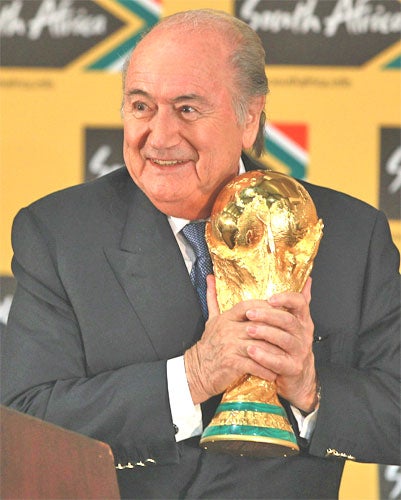Hosts see red as World Cup bill soars – but Fifa is £1.7bn in black

Football's world governing body Fifa is set to announce record earnings today just as anger is building in South Africa over the final bill for hosting the continent's first World Cup.
Fifa officials gathering for the organisation's annual congress in Johannesburg will reveal that annual income has leapt by 50 per cent since the last World Cup was staged four years ago in Germany.
The non-governmental organisation is sitting on more than $1.1bn (£0.76bn) in equity, according to a provisional copy of its own financial report.
The announcement of the huge pay day comes as the latest estimate of the cost of staging the finals comes to $8.6bn in a country where more than 40 per cent of the population live on less than $2 a day.
Forecasts predict profits in excess of $2.5bn (£1.7bn) for the Swiss-registered charity, which means it will make more money from the World Cup than the host country will.
The most optimistic predictions see the month-long tournament giving the South African economy a 0.5 per cent bump in GDP – Fifa's profits would be equivalent to 0.7 per cent of South African GDP.
Despite the immense geopolitical power that Fifa wields, the NGO is accountable only to the courts in Switzerland where it enjoys tax-free status. It refuses to answer questions such as the annual earnings of the organisation's Swiss president Sepp Blatter.
"It's completely wrong and deeply improper that Fifa is making money out of this," said Stefan Szymanski, an economist at City University's Cass Business School who was called in to advise the South African government after it won the bid in 2004.
In the euphoria that followed the announcement six years ago that South Africa had won its bid, few questions were asked about the terms of the deal. In private, government officials are now accusing Fifa of acting like the "mafia" in sealing a one-sided licence to print money. "We told them it would be an economic disaster and that they should renegotiate the contract as Fifa would never dare take the World Cup away after it was awarded," said Mr Szymanski.
Under the terms of a confidential agreement signed between Fifa and Pretoria, the South African government takes no share of television, marketing deals or ticketing – the mega-event's main money spinners – and shoulders the cost of new sports stadia and related infrastructure.
In addition, Fifa earnings are protected by a specially created "tax bubble" which means even the associated merchandising and match day events are untaxed and VAT on some items will have a "negligible impact" on tax receipts, according to the South African Revenue Service (Sars).
"This will not be a revenue raising exercise for us," said Sars spokesman Adrian Lackay.
He said that South Africa had paid a premium to Fifa to secure the World Cup – giving away millions of dollars in potential taxes that European hosts Germany had not agreed to for the 2006 tournament.
University of Cape Town researcher Sophie Nakueira said that South Africa was "no longer calling the shots" and had effectively ceded sovereignty to the football overlords. "The traditional notion of national sovereignty is irrelevant when bodies like Fifa or the International Monetary Fund use governments to advance their own objects, which in Fifa's case is to further its profits," she said.
The revelations of spiralling costs and reduced visitor numbers which have plummeted from the initial estimates of 750,000 to 370,000 has been greeted with dismay in sub-Saharan Africa's biggest economy.
It has prompted public calls for a fuller accounting of where the money has gone. South Africa's Mail and Guardian newspaper yesterday won its bid to force Fifa and its local subsidiary organising committee, as well as the South African government, to release full details of which businesses had profited from World Cup contracts.
Close attention will be paid to how the money was spent at lavish new stadia like Cape Town's Green Point, built at Fifa's prompting, despite the existence of cheaper alternatives.
Mr Szymanski said that Fifa's insistence on "lavish spending" was at the heart of the problem. "There's so much evidence that there's not even an argument any more – mega-events don't deliver the financial extravaganza that is promised," he said.
The World Cup in numbers
750,000 visitors were projected to come – current predictions are below 370,000
£830,000 The unconfirmed annual salary before bonuses of Sepp Blatter
£1.25bn The profit earned by Fifa from the last World Cup in Germany
21,560,000 South Africans live on less than $2 per day
0.5 per cent The bump in annual growth that South Africa can now expect from the World Cup
50 per cent Increase in Fifa's annual profits since the 2006 World Cup
Join our commenting forum
Join thought-provoking conversations, follow other Independent readers and see their replies
Comments
Bookmark popover
Removed from bookmarks